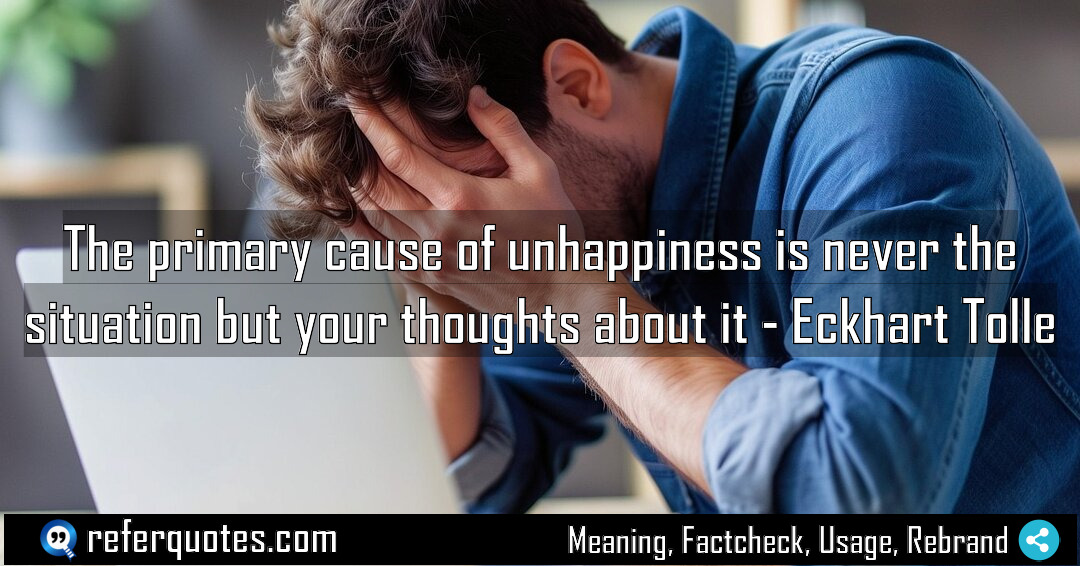
You know, “The primary cause of unhappiness is never the situation” is a game-changer. It shifts the entire source of our suffering from external events to the internal narrative we create about them. It’s about realizing you’re not a victim of your circumstances, but of your thoughts.
Share Image Quote:
Meaning
The core message is that our pain doesn’t come from what happens to us, but from our mental resistance to it. It’s the story we tell ourselves about an event that causes the suffering, not the event itself.
Explanation
Let me break this down like I would for a client. I’ve seen this principle play out so many times. Two people can face the exact same situation—a job loss, a traffic jam, a critical comment—and have completely different emotional responses. Why? Because one is trapped in a storm of negative thoughts (“This is a disaster, I’m a failure, my life is over”), while the other observes the situation without that frantic mental commentary. The situation is neutral until your mind labels it as “bad.” Your power lies in that gap between what happens and how you choose to interpret it. It’s about moving from being a prisoner of your mind to being the watcher of your mind.
Quote Summary
Reading Level80
Aesthetic Score84
Origin & Factcheck
This quote comes directly from Eckhart Tolle’s 1997 book, The Power of Now: A Guide to Spiritual Enlightenment. It’s a central tenet of his teachings. You’ll sometimes see similar sentiments misattributed to Stoic philosophers like Marcus Aurelius, and while the Stoics had a similar idea about perception, this specific phrasing is pure Tolle.
Attribution Summary
Author Bio
Eckhart Tolle, born in Germany in 1948, became widely known after his transformative insights at age 29 led him to teach about presence and inner stillness. He later settled in Vancouver and wrote The Power of Now and A New Earth, which topped bestseller lists and inspired millions. He collaborates with major platforms, hosts retreats, and shares teachings through his online portal. The also includes Stillness Speaks and Guardians of Being. He writes in a clear, compassionate voice that invites practical practice in everyday life.
| Official Website | Facebook | X| Instagram | YouTube
Where is this quotation located?
| Quotation | The primary cause of unhappiness is never the situation but your thoughts about it |
| Book Details | Publication Year/Date: 1997; ISBN: 978-1577314806; Last Edition: New World Library Edition (2004); Number of Pages: 229 |
| Where is it? | Chapter 2: Consciousness: The Way Out of Pain, Page 33 |
Context
In the book, Tolle is building his case for what he calls the “pain-body”—that accumulated emotional pain we carry—and how it feeds on our negative thinking. He’s arguing that to find peace, we must dis-identify from our stream of constant, often unconscious, thought. This quote is a cornerstone of that argument.
Usage Examples
So, how do you actually use this? It’s a mental reframe. Let’s say you’re stuck in traffic. Instead of letting the thought “I’m going to be late, this is ruining my day!” take over, you notice the thought. You might say to yourself, “Ah, there’s the ‘this is ruining my day’ story again.” That simple act of noticing creates space and deflates the thought’s power.
Or in a work context, you get critical feedback. The immediate thought might be “They think I’m incompetent.” That thought hurts. But if you can see it as just a thought, not an absolute truth, you can assess the feedback more objectively. The people who benefit most from this are high-achievers, chronic overthinkers, and anyone who feels like life is constantly happening *to* them.
To whom it appeals?
| Context | Attributes |
|---|
| Theme | Principle (838) |
|---|
| Audiences | coaches (1277), leaders (2620), professionals (752), readers (72), students (3112), therapists (555) |
|---|
| Usage Context/Scenario | counseling sessions (13), emotional intelligence courses (8), motivational talks (410), self-improvement books (29), stress management seminars (1), team workshops (29) |
|---|
|
|
|
|
|
|
|
|
|
|
|
Share This Quote Image & Motivate
Motivation Score82
Popularity Score91
Shareability Score89
Common Questions
Question: Does this mean I should just ignore truly bad situations?
Answer: Not at all. It’s the opposite. It means you see the situation clearly, without the fog of panic and negative judgment, so you can respond to it effectively rather than just react emotionally.
Question: How is this different from just “positive thinking”?
Answer: This is a crucial distinction. Positive thinking is often about replacing a “bad” thought with a “good” one. Tolle’s approach is more profound—it’s about dis-identifying from *all* thought streams to find a deeper peace that isn’t dependent on the content of your thoughts.
Question: Isn’t this really hard to do in the moment?
Answer: Absolutely. It’s a practice, not a switch you flip. The magic isn’t in never having the negative thought; it’s in catching yourself faster and faster each time. It’s a muscle you build.
Similar Quotes
Most people choose unhappiness over uncertainty… it’s one of those quotes that hits you right in the gut because you see it play out everywhere, from the corporate world to…
People will choose unhappiness over uncertainty because the known devil feels safer than the unknown angel. It’s a survival instinct that now holds us back from the lives we truly…
Happiness doesn’t depend on any external conditions, it’s a game of mental attitude. It’s the ultimate leverage for taking control of your own emotional state, and honestly, it’s a complete…
Happiness is a product of daily habits, not a goal. It’s about the small, consistent things you do, not some distant finish line you’re chasing. This shift in perspective is…
Remember, happiness doesn’t depend… it’s a powerful reminder that our inner world dictates our joy, not our external circumstances. Table of Contents Meaning Explanation Origin & Factcheck Context Usage Examples…
